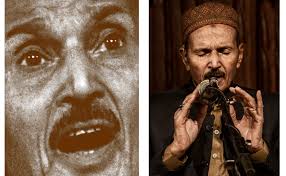Contribute
| A Sufi Quawwali Concert Spreads The Message Of Divine Love! |
Shuchita Rao
07/06/2016
The Sufi traditions of Pakistan got the spotlight at the Peabody Essex Museum in Salem, MA on June 26 with a live performance of the Hindustani music genres of Khayal and Quawwali. The artists were Ustad Naseeruddin Sami, legendary vocalist from Lahore, Pakistan and his talented sons and disciples. The museum’s curator Sona Datta, who specializes in presenting innovative exhibitions that feature living artistic traditions introduced the artists and the topic of Sufi traditions at the beginning of the program. “Sufis believed that the universal message of peace and love was wide and deep enough to accommodate the culture of diverse traditions.†she said to an auditorium packed with people of Indian, Pakistani and American heritage. The focus of the first half of the program was “Khayal†music which Sona explained to mean “to imagine or improviseâ€. The khayal genre is a meditation on the nature of melody†she added. Ustad Sami commenced the afternoon raga Patdeep with a detailed and evocative alaap (slow melodic movement) in the Dhrupad style. Listeners were treated to sweeping views of raga Patdeep’s landscape created through resting for considerable periods of time on Shadaj, Nishad and Pancham musical notes in the lower, middle and upper registers. Graceful glides to komal gandhaar using the “meend†(sliding movement) ornament created great beauty and a sense of deep yearning. The khayal “Dhan dhan bhaag mori sujnee†set to a medium tempo cycle of 16 beats (teentaal) benefitted from sensitive and nuanced accompaniment on the tabla by New England’s celebrated artist Shri. Nitin Mitta. Karl Thompson, a concert attendee who seemed visibly moved by the rendition said “The Ustad’s music was very expressive. It spoke to my soul.†The delicious lemonade served to the concert attendees in the lobby outside PEM’s Morse auditorium during a brief intermission was certainly a welcome relief on a hot day, but, it did not quite quench their thirst for more music. It became apparent that the quwwali segment presented by the sons and disciples of Ustad Naseeruddin Sami that ensued the lemonade break, succeeded in satiating their musical appetites. “Quawwali is a genre of music that is atleast 800 years old and traces its time to the 13th century, to the time of Amir Khusro, a polyglot, philosopher, poet and inventor of the instruments sitar and tabla. It is an ecstatic devotional form that encapsulates the unification of sacred and secular messages of Muslim and Hindu cultures.†said Sona Datta as a way of introducing the genre to concert attendees. The accomplished Sami brothers proceeded to present compositions in Arabic/Persian, Punjabi and Hindi languages penned by Hazrat Amir Khusro to illustrate the point. Commencing with a traditional Sufi composition “Sazeenaâ€, an instrumental piece on the harmonium set to raga Desh and Chandrakauns accompanied by modulated play of 8 beat cycle keherwaa taal, the performers engaged the audience right from the inception of the quawwali. There was a percussive quality to the rhythmic clapping provided by one of the members of the six-person team that had three taelented vocalists, two harmonium players and a tabla/dholak player. After Sazeena came “Man Kunto Maulaâ€, a Manqabat qawwali composed by Amir Khusro in the praise of Ali set to raag Bhoop. “Whoever accepts me as a master, Ali is his master too†was the essence of this song. An Indian woman, a Pakistani woman and an American woman from the audience rose to dance spontaneously in the aisles of the auditorium. Others clapped to the rhythmic music. Through Sufi compositions such as “Main tho piya sung naina lagaa aayi reâ€, “Mora piya ghur aaya†and “Laal mori†the quawwals told stories of spiritual connection with the divine . With voices of the Quwwaals soaring to ecstatic peaks in the higher registers, the music seemed to transport the artists themselves and the audience closer to the divine. Ay sakhi kaase kahoon, mohay laaj lagey Maine laaj ka ghoonghat khol diya Piya jeet gaye mai haar gayi Ghur naari gawaari kahe so kahe Main nijaam se naina lagaa aayi re… (My dear friend, who can I possibly tell this secret that I was taken in by my lover’s gaze? I feel shy to talk about it openly!) The quawwalis incorporated several elements of Hindustani classical music such as sargam (solfege) and aakaar taans (fast melodic movements) in addition to rhyming lyrics set to simple melodic tunes. A short percussion solo towards the end of the “Laal Mori†composition highlighted the skills of the dholak and tabla player proved popular with the audience. “This concert was a special surprise for my husband and me. Our son who loves Sufi music brought us here. It was truly a divine experience†said Aruna Marwaah from Dracut, MA. The Sami brother quawwals dedicated their music to the memory of the late Ahmed Sabri, an eminent Quawwal musician who was murdered in Pakistan last month. The fact that the spirited music of the evening was tied to educating the audience about the philosophy and music of the Sufis and for the show of empathy by the performers for a fellow musician who suffered a dastardly act of violence was touching. Kudos to the performers and PEM’s curator Sona Datta and staff for organizing a memorable performance by Ustad Naseeruddin Sami and his sons/disciples.
Mohe pee ki najariya maar gayi
You may also access this article through our web-site http://www.lokvani.com/
